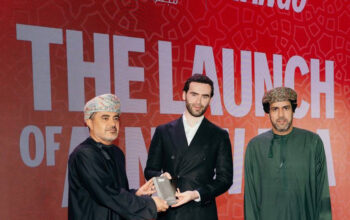The Italian Minister of Agriculture, Food Sovereignty and Forests,
H.E. Francesco Lollobrigida, and Matteo Zoppas, newly elected President of the Italian Trade Agency, inaugurated the Italy Pavilion at Gulfood
180 food producers and Michelin Star Chefs will give an authentic taste of Italy at Gulfood 2023 (Dubai, 20-24th February)
Dubai, UAE; 20th February 2023: Italian agri-food world exports reached a historic 60 billion euros value last year, up by 17%.
Towards the UAE the trend was even very much stronger with an increase of +46% for a record value of almost 400 mln euros (jan.- nov.2022)
A wide sample of this authentic Italian offer, synonymous all over the world of safy, indisputable quality and variety, will be showcased this week at the Italian Pavillion and its 180 exhibitors at Gulfood 2023 (Dubai World Trade Centre, 20-24 February).
At the Italian Food Lab organized by the Italian Trade Agency, the Governmental Agency which promotes the Made In Italy in the world in accordance and along the guidelines of the Ministry of Foreign Affairs, Michelin Star Chefs including Saverio Sbaragli (Al Muntaha* Burj Al Arab) and Giovanni Papi (Armani Ristorante* Burj Khalifa) ans other Italian Chefs working in most prestigious Emirati restaurants will prepare classic Italian recipes using only 100% authentic and genuine Italian ingredients with a special focus on Pizza, Gelato and Caffè.
Italian cuisine is considered one of the best in the world for its variety of tasty and healthy dishes. The high quality raw ingredients along with the high safety standards throughout the food and production process, contributes to the global success of Italian food.
Among the boosters of Made in Italy f&b products all over the world and in the UAE: wine and other beverages (8 bln euros to the world; 68 mln to the UAE, +61%); Pasta and cereal (over 7 billion euros exported worldwide; 50 mln to the UAE, +31%). Extra virgin olive oil, as well as cheeses and cured meats, have also registered a significant increase in exports.
Organic ingredients have also contributed to the growth: sales of Made in Italy organic ingredients around the world reached 3.4 billion euros in 2022 (+16% compared to 2021). The recognition of organic Italian agri-food is also demonstrated by the long-term growth (+181% compared to 2012, an almost triple increase in value) and by the export share on the Made In Italy food basket (6% of total Italian agri-food exports in 2022 compared to 4% in 2012).
The Italy Pavilion and the Italian Food Lab at Gulfood were inaugurated by Matteo Zoppas, President of the Italian Trade Agency, together with H.E. Francesco Lollobrigida, Italian Minister of Agriculture, Food Sovereignty and Forests.
During the inauguration Matteo Zoppas said: “Our successful role in supporting the internationalization of Italian SMEs is being shown this week and we are very proud that the export of Italian agri-food products to the UAE have reached double digit growth in 2022, with the larger increase among the whole products exported by Italy to the UAE: + 46%
With the motto Sustainability is SustainabITALY, this year we are committed to boost even more “sustainable Italy-UAE partnerships” also in the food sector. This would represent also be one of our concrete contributions for the Agenda of next COP28 which will be host in the UAE later this year.”
As a matter of fact, organic agriculture plays a fundamental role in helping to preserve soil fertility and in contrasting climate change, the environment and the loss of biodiversity. With 17.4% of the total cultivation area dedicated to bio agriculture (2.1 million hectares, + 79% from 2012), Italy is one of the European countries with the highest number of companies involved in the organic sector – over 80,000.
Regarding product’s certifications, Italy has 842 classifications and holds 1st place in Europe for recorded and protected food-farming and viticulture products that contribute to 21% of exports in the Italian food-farming industry.
Over the last decade Italian agriculture recorded a drop of -32% for the use of phytosanitary products, confirming its position as the most sustainable country in Europe. The Italian industry with 30 M equivalent tons of CO generated is more virtuous than any other EU countries too.








